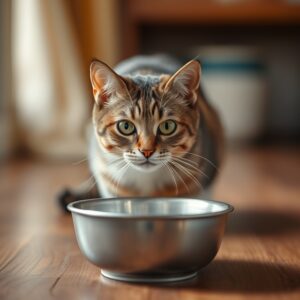Cats are fascinating creatures with unique dietary needs. While their ancestors were skilled hunters, our domesticated feline companions have adapted to a more sedentary lifestyle. This begs the question: can cats eat human food safely? The answer, as with most things in life, is nuanced.

Can cats eat human food safely?
### The Feline Digestive System: A Different Beast
Understanding the feline digestive system is crucial to answering this question. Unlike humans, cats are obligate carnivores, meaning their bodies are designed to primarily digest meat.
* Taurine Deficiency: Cats lack the ability to synthesize taurine, an essential amino acid found abundantly in animal tissue. Taurine is crucial for heart health, vision, and reproduction. A deficiency can lead to serious health problems, including blindness and heart failure.
* Limited Enzyme Production: Cats produce fewer enzymes than humans to break down carbohydrates. This means they struggle to digest grains and starches efficiently, potentially leading to digestive upset.
### Safe Human Foods for Cats
While a cat’s diet should primarily consist of high-quality cat food, there are certain human foods that can be safely given as occasional treats in moderation.
* Cooked Lean Meat: Small amounts of cooked chicken, turkey, fish (boneless and skinless), or beef can be a healthy treat. Avoid fatty cuts of meat, as these can cause digestive issues.
* Eggs: Cooked eggs are a good source of protein and can be given in moderation.
* Plain Yogurt: Unsweetened, plain yogurt can be a good source of probiotics for gut health.
* Cooked Vegetables: Some cats enjoy cooked vegetables like carrots, green beans, or sweet potatoes.
### Foods to Avoid Feeding Your Cat
Many common human foods are toxic to cats and should never be given to them.
* Chocolate: Contains theobromine, which is toxic to cats and can cause vomiting, diarrhea, hyperactivity, tremors, seizures, and even death.
* Onions and Garlic: These contain compounds that can damage red blood cells and lead to anemia.
* Grapes and Raisins: Can cause kidney failure in cats.
* Alcohol: Toxic to cats and can cause vomiting, diarrhea, incoordination, coma, and death.
* Xylitol: An artificial sweetener found in many sugar-free products, xylitol can cause a rapid release of insulin in cats, leading to hypoglycemia (low blood sugar), liver failure, and death.
* Macadamia Nuts: Can cause weakness, tremors, vomiting, and hyperthermia in cats.
### Signs of Food Poisoning in Cats
If you suspect your cat has eaten something toxic, watch for these signs:
* Vomiting
* Diarrhea
* Loss of appetite
* Lethargy
* Weakness
* Tremors
* Seizures
* Difficulty breathing
If you notice any of these symptoms, contact your veterinarian immediately.
### Moderation is Key
While some human foods can be safe for cats in moderation, it’s important to remember that their primary diet should consist of high-quality cat food formulated to meet their specific nutritional needs.
Treats should only make up a small percentage of their daily calorie intake. Overfeeding human food can lead to obesity, digestive problems, and nutritional deficiencies.
### Conclusion
Cats are curious creatures who may be tempted by the smells and tastes of human food. However, it’s crucial to be aware of the potential dangers and to exercise caution.
By understanding the feline digestive system and avoiding toxic foods, you can ensure that your furry companion enjoys a long, healthy life. Remember, when in doubt, consult your veterinarian for guidance on what is safe for your cat to eat.


